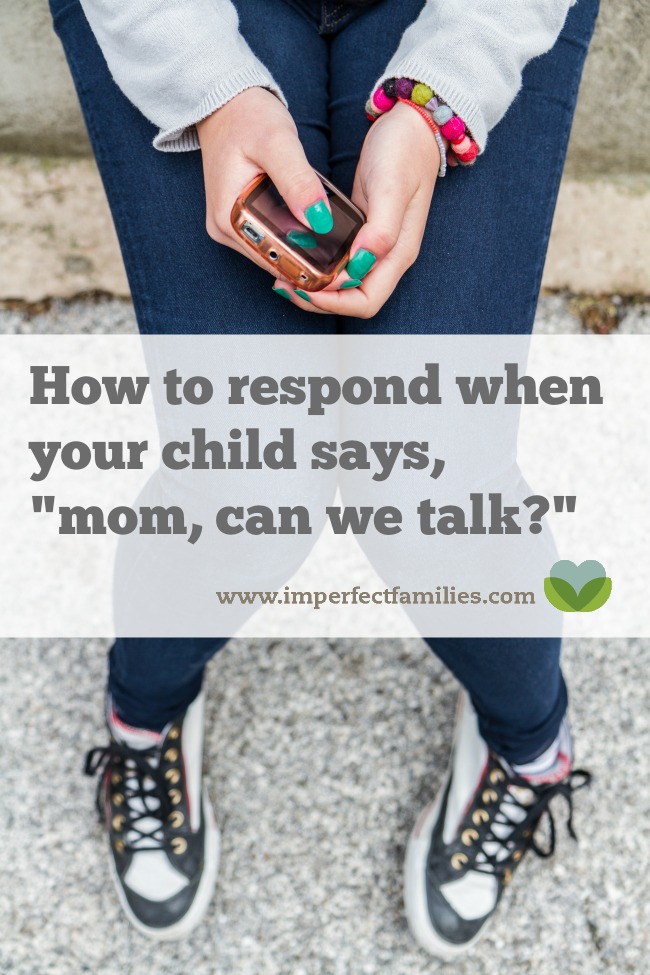
Sometimes, it’s the simplest words that are the most important.
“I’m going to throw up.”
“The kitchen is on fire.”
“Mom, can we talk?”
They are important, significant, meaningful words.
While you would probably immediately respond to the first two statements, the third is often overlooked, minimized, or ignored.
You don’t mean to brush aside your child’s request for attention, it’s just that life is complicated. You are busy, tired, overwhelmed by life’s responsibilities and balancing your attention between multiple children.
Besides, if you were to ask your child, “can we talk?” you would probably be met with grunts, groans or eye-rolls.
Learning to tune into your child’s (sometimes subtle) requests about little things can set a firm foundation for the more major challenges that come up in the future.
The Significance of “Can we talk?”
As children age, their dependence and reliance shifts from parents to peers. In some cases, it seems to happen overnight! Suddenly, you no longer hold the answers to all life’s dilemmas. Now, it’s friends who influence how your child navigates through difficult times.
The fact that your child wants to talk with you means that they are choosing you over their very influential peer group.
It means that they still value your opinion, your support, and maybe even your guidance.
It means that you, as a parent, still have an opportunity to help your child learn and grow as an individual.
It gives you a chance to connect, build or repair the relationship.
And, while these moments may become farther and farther between, they are as important when your child is 6 as they are when your child is 16.

Silent requests for attention.
Some kids will never utter the words, “can we talk?”
Instead, they will act out, tantrum, hit their brother, or prolong the bedtime routine. Older kids may become more isolated or irritable, pushing you away, even though it seems like there’s something on their mind.
Or, your kids may simply, “hang around.” (And when you ask why, they’ll probably say there’s “no reason.”)
Don’t be fooled by these silent requests for attention!
Be the one to bring it up.
Offer to listen by saying a simple, “I’ve noticed…What’s up?”
Even if your child responds with a glum “nothing,” at least you have opened the door for a future conversation.
How to respond when your child says, “Can we talk?”
- In an ideal world: Respond immediately, stop what you are doing, make eye contact, and let them know you’re ready by answering, “Sure, what’s up?” Listen closely to what your child has to say, and respond empathetically, without making assumptions or passing judgment.
- If you have to delay: Set a specific time to catch up later, schedule it as soon as possible. Follow through by approaching your child at the scheduled time. However, realize that the moment may pass, and your child may change their mind about needing input from you.
- If you’re tired: Listen as long as possible. Offer suggestions such as writing their thoughts to you in a journal or scheduling a time to continue the conversation at another time (again, realize that they may not want to talk later). If your child often talks at bedtime, you may need to make it part of the routine.
- If your child would talk “non-stop” or “forever”: Schedule one-on-one time at a consistent time each day so your child has your undivided attention for a set number of minutes. Then, ask your child to join you in the kitchen to continue the story while you start dinner. Or offer to journal back and forth.
- If you don’t know what to say: Take a deep breath. Say, “Give me a minute to process everything you just said” or “Thank you for sharing that with me.” Be empathetic. Ask if your child wants your advice or if they just want you to listen. Sometimes silence with a comforting hug is better than any verbal response.
The more often you take the time to respond well, you build up your child’s confidence, showing them that you are a safe, secure place to turn when life is confusing.
Your kids want you to listen.
They need you to listen.
Just like you would respond to a potentially ill child or an unruly kitchen fire, your kids need you to answer their bids for attention.
Want to learn to build an atmosphere of respect and love in your home?
Good News! My Communication for Imperfect Families eCourse is coming soon. You’ll learn how to get your kids to listen without yelling or repeating yourself 1,000 times, how to stop the backtalk and arguments, and confidently handle meltdowns and disagreements.
Interested? Click here to learn more!
Please note: If your child brings up a serious, life-threatening, concerning topic, please seek support from a mental health provider. If you’d like to learn more about responding in a way that keeps your relationship strong, contact me for more information about Parent Coaching.



Comments have been turned off to retain the privacy of all families. If you have a question or comment on the topic, you're always welcome to contact me.